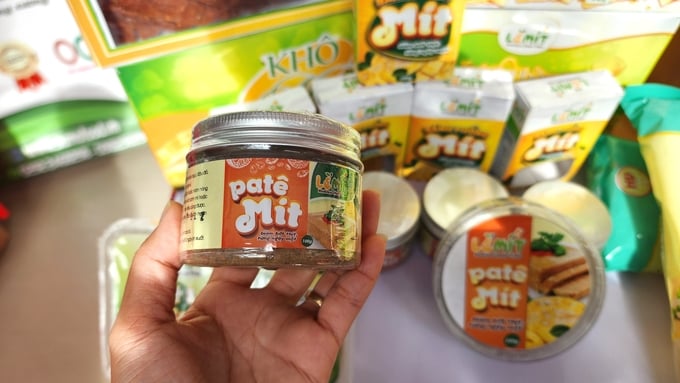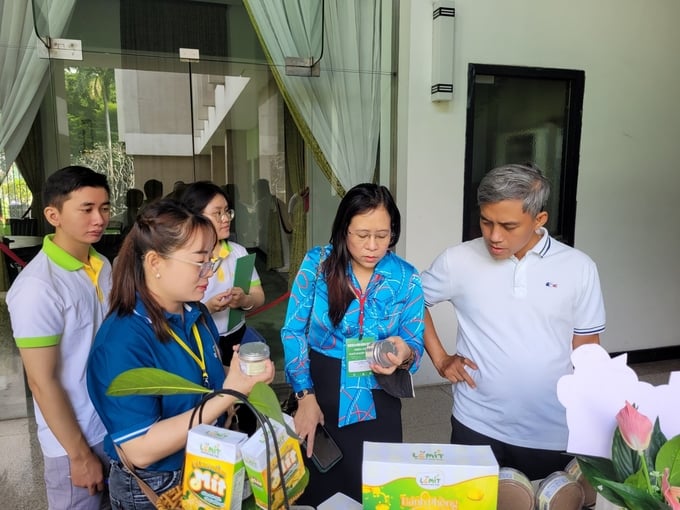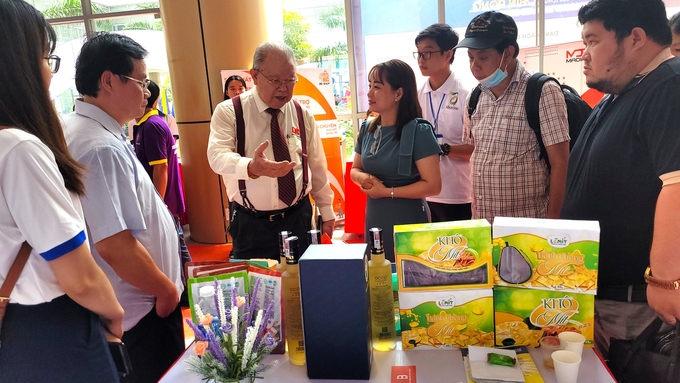May 31, 2025 | 15:11 GMT +7
May 31, 2025 | 15:11 GMT +7
Hotline: 0913.378.918
May 31, 2025 | 15:11 GMT +7
Hotline: 0913.378.918
The current trend of using plant-based meat to replace animal meat in daily meals is becoming increasingly popular. This trend is observed to have flourished in many countries around the world including the United States and China.

The Lemit plant-based meat product set is made from jackfruit. Products are properties of the Mai Duong Food and Spice Sauce Manufacturing Facility. Photo: Kim Anh.
After realizing that this as a future food consumption trend, many Vietnamese businesses operating in the food production industry have promoted investment in fully exploiting agricultural value to process a variety of plant-based meat products.
The Mekong Delta is known for its incredibly large area of jackfruit production with an estimated output of 420 thousand tons in 2022. As a result of the deep drop in jackfruit prices over the past few years, an idea to increase the value of jackfruit has been formed. The Lemit plant-based meat product was among such ideas, conceived by Ms. Cao Thi Cam Nhung, owner of Mai Duong Food and Spice Sauce Factory. The product has since received many good reviews from experts regarding its future development.

Jackfruit mock-paste - a key product made by the company. Photo: Kim Anh.
Ms. Cao Thi Cam Nhung said that she originally formed the idea of creating plant-based meat from jackfruit during the outbreak of the Covid-19 pandemic in 2020. The price of jackfruit at the time dropped to roughly 1,500 VND/kg, and many farmers had to cut down their trees because there were no buyers for the fruit. Ms. Nhung had the advantage of owning an area of approximately 0.8 hectares of jackfruit material. With a solid foundation, she embarked on product research; many varieties of jackfruit were selected for testing, and ultimately Thai jackfruit was the final ingredient Ms. Nhung selected to use for her product.
“In the Mekong Delta, jackfruit is often used both fresh or dried, but few people know jackfruit meat is one of the ingredients frequently used in vegetarian products. It has a high nutritional content, in addition to being cholesterol-free, and suitable for a healthy lifestyle", Ms. Nhung explained.

Consumers learning about Lemit plant-based meat products. Photo: Kim Anh.
The first three products under the Lemit plant-based meat brand were born in early 2022, including: jackfruit mock-paste, jackfruit mock fish cake, and jackfruit puff pastry. So far, the company's plant-based meat product range has expanded to include dried jackfruit, flavored jackfruit snacks, and jackfruit chips. Ms. Nhung shares that the company will continue to research and strive to bring to the market 3 more products by the end of the year, focusing on products for snacking preferences.
Depending on each type of product, there will be different ways to use ingredients from the jackfruit. Namely, puff pastry utilizes ripe jackfruit, jackfruit mock-paste utilizes young jackfruit, and so on. Ms. Nhung also improvises and mixes jackfruit seeds in her products. Accordingly, the jackfruit has also been thoroughly utilized in the production of plant-based meat products (with the exception of the skin and pulp). Each type of food must follow its own processing stages and procedures. Most notably, the secret to success lies in the processing of jackfruit latex, especially in young jackfruit, so as not to affect the taste of the product.

Prof. Vo Tong Xuan presenting the Lemit plant-based meat products. Photo: Kim Anh.
In the immediate future, the Lemit plant-based meat brand will expand its scale of production facilities, namely: invest in equipment and machinery, develop HACCP and ISO standards to meet market demand, bring products to the supermarket system as well as vegetarian food stores chain. The company has also connected with the Dutch and American markets, and they are in the process of finalizing procedures for export in the near future.
Moreover, Ms. Nhung is planning to add a new 3-hectare material area in Nga Bay city, Hau Giang province, with emphasis on VietGap and LocalGap standards. With the mentoring support from Prof. Vo Tong Xuan, Ms. Nhung hopes to achieve success in the future, building a distinctive food brand from jackfruit for Hau Giang province. In addition to maximizing the value of jackfruits, these plant-based meat products also contribute to diversifying the food market, and meeting food needs for the future.
Translated by Nguyen Hai Long

(VAN) Seafood by-products are opening a new path, combining green growth and technological innovation to enhance the industry's value.

(VAN) Mr. Nguyen Thanh Cong, Vice Chairman of the Son La Provincial People's Committee, reflects on Son La’s journey from barren hills to fruitful orchards after a decade of hard work.

(VAN) FAO’s Director-General addresses the 5th Baghdad International Water Conference.
/2025/05/26/1716-4-nongnghiep-191706.jpg)
(VAN) Chain linkages, technological innovation, and raw material zoning are three strategic pillars for the coconut industry to strongly develop and elevate its position on the global agricultural map.
![Advanced mariculture – an inevitable trend: [4] Accompanied by scientists](https://t.ex-cdn.com/nongnghiepmoitruong.vn/608w/files/sohk/2025/05/13/1941-pgsts-vo-van-nha-140958_717.jpg)
(VAN) According to Assoc. Prof. Dr. Vo Van Nha, Director of the RIA III, the development of advanced offshore mariculture is no longer an option but an essential path for Vietnam’s fisheries sector.

(VAN) Vietnam is intensifying the development of mollusk farming areas that meet international standards, aiming for sustainable growth and enhancing its export position in the global seafood market.
![Advanced mariculture – an inevitable trend: [3] Policy-driven momentum](https://t.ex-cdn.com/nongnghiepmoitruong.vn/608w/files/doanhtq/2025/05/21/0104-0616-0348-nuoi-bien-170339_789.jpg)
(VAN) To ensure the success of offshore mariculture that uses advanced technologies, it is essential to establish supportive policies that inspire both individuals and enterprises to invest with confidence.